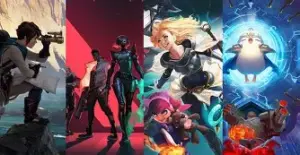Riot Games, the name synonymous with innovation in the gaming industry, continues to make headlines in 2025. Founded in 2006, Riot Games rose to fame with League of Legends, and has since evolved into a global leader in competitive gaming. Known for developing, publishing, and supporting top-tier esports titles, the company has built an ecosystem that stretches far beyond just games.
With a strong focus on community, continuous innovation, and esports infrastructure, Riot Games is now more than just a game developer—it’s a cultural phenomenon.
Riot Games Key Titles and Ecosystem in 2025
The company is no longer riding solely on the success of League of Legends. Riot Games has successfully expanded its portfolio with multiple hit titles including:
- Valorant – A tactical first-person shooter that’s giving major competition to games like CS:GO and Apex Legends.
- Teamfight Tactics (TFT) – An auto-battler that draws strategic players into the LoL universe.
- Legends of Runeterra – A collectible card game built on the League of Legends lore.
- Wild Rift – The mobile version of League of Legends, optimized for mobile play.
These games form the core of Riot’s expanding universe and are backed by frequent content updates, balancing patches, new characters (Agents, Champions), and events.
Riot Games’ Esports Strategy
In 2025, Riot Games’ investment in esports is unmatched. Each of its flagship games is integrated into a competitive structure:
League of Legends Esports
The League of Legends World Championship (Worlds) remains one of the most viewed esports events globally. With multiple regional leagues like LCS, LEC, LCK, and LPL acting as qualifying tournaments, Riot ensures a strong competitive hierarchy.
Valorant Champions Tour (VCT)
The Valorant Champions Tour is now a full-fledged global circuit. With franchises and partnered teams, Riot Games has created a long-term esports ecosystem that rivals even traditional sports leagues.
New Releases and Future Projects
Riot Games is currently working on Project L, a fighting game set in the League of Legends universe. The gameplay reveal teased in 2024 generated significant buzz, and it’s slated for beta testing in late 2025.
There’s also Project F, a co-op ARPG (Action Role-Playing Game) hinted to feature MMO-like mechanics. With the rise of open-world co-op games, expectations are high.
Additionally, Riot is rumored to be working on expanding its animation division following the massive success of Arcane, the Netflix series based on LoL. Season 2 is set to release soon, promising to dive deeper into Runeterra’s rich narrative.
Riot’s Global Expansion Strategy
In 2025, Riot Games has established regional publishing centers and development studios across North America, Europe, Southeast Asia, and Latin America. The company emphasizes localization, ensuring each market receives culturally relevant content.
Riot has also doubled down on server infrastructure, reducing ping in high-population regions and enhancing competitive integrity.
Community Engagement and Player Support
Riot Games has always prioritized transparency and community involvement. Through Dev Diaries, Ask Riot sessions, and feedback loops on Reddit and Discord, they ensure players feel heard.
Recent efforts include:
- Enhanced reporting and moderation tools
- Real-time ban systems for toxicity
- Collaboration with mental health NGOs to provide player support resources
Their player-first approach helps them retain a loyal community base while continuously acquiring new users.
Riot Games and Artificial Intelligence
In 2025, Riot has begun integrating AI tools for better matchmaking, cheating detection, and even voice moderation. These tools help improve fairness in competitive games like Valorant and League of Legends.
Moreover, generative AI is being used to create dynamic lore content, procedural environments, and intelligent bots for training purposes in games.
Riot Forge: The Publisher Arm
Riot Forge, the indie-focused label under Riot Games, continues to thrive in 2025. Titles like Ruined King and The Mageseeker have allowed external developers to tell unique stories within the LoL universe.
This move helps Riot grow its IP without exhausting its internal dev teams, while simultaneously expanding the Runeterra narrative.
Financial Performance and Market Influence
Riot Games remains privately held under the ownership of Tencent, the Chinese tech conglomerate. Despite this, the company maintains a significant influence on the Western gaming market. In 2025, Riot is one of the highest-earning gaming companies globally, owing to:
- Microtransactions from skins and battle passes
- Esports sponsorships and broadcasting rights
- Merchandising and IP licensing deals
Their monetization model is mostly cosmetic-focused, avoiding pay-to-win mechanics and keeping competitive integrity intact.
Challenges and Criticisms
Like any large corporation, Riot Games has faced criticism. Past allegations around workplace culture led to internal restructuring. In 2025, the company continues to implement diversity and inclusion programs and has released yearly transparency reports on hiring and employee satisfaction.
Some players have also criticized matchmaking and balancing decisions, especially in Valorant, prompting Riot to increase community testing before rolling out major changes.
Final Thoughts: Riot Games in the Future of Gaming
In 2025, Riot Games stands as a towering figure in the gaming world. With a well-diversified game portfolio, thriving esports infrastructure, innovative storytelling, and a community-first philosophy, the company continues to redefine what a modern gaming studio can be.
Whether you’re a hardcore League veteran, a Valorant sharpshooter, or just excited about Arcane Season 2, Riot Games has something for every kind of gamer.
Also Read: Oxygen Miner Daily Combo 1 August 2025
